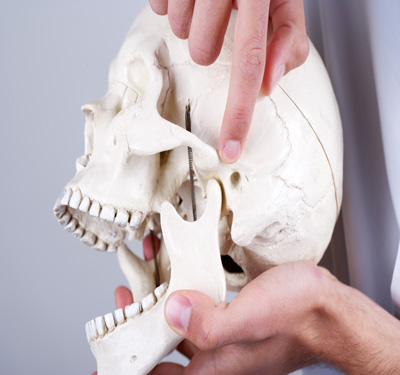Mouths wide open: A rare case of dislocated jaw
A rare case has been reported in Oman of a toddler unable to close her mouth due to non-trauma-related dislocation of the jaw joint.
Published online 30 October 2016

Temporomandibular joint dislocations are sometimes caused by trauma to the jaw.
marvinh/ iStock / Getty Images Plus
The joint that pivots the jawbone with the skull, called the temporomandibular joint (TMJ), can sometimes become dislocated, leading to an inability to close the mouth. This dislocation can happen as a result of trauma, but is more commonly caused by problems in the joint and/or surrounding tissues, causing the joint to dislocate out of its socket when the mouth is opened excessively. It is most commonly seen in women between the ages of 20 and 30.
This dislocation is very rare in children. Muhammad Khilji and Aftab Malik, of Sultan Qaboos University Hospital’s emergency department in Oman, reported the case of a 26-month-old girl with temporomandibular joint dislocation on both sides of the jaw in the Journal of Emergency Medicine Trauma & Acute Care.
The child was brought to the emergency department presenting with drooling and an inability to close her mouth that had been on-going for two hours. Before the dislocation, she was fine and had eaten only two hours earlier. Clinical examination and X-rays revealed mild tenderness on both sides of the jaw, absence of injury marks, and anterior displacement of the lower jaw. Her vital signs were normal.
To treat her, the child was sedated and the clinician manually returned the lower jaw into its joint. She was discharged once she fully regained consciousness and her ability to move her jaw and speak. She was bandaged to prevent excessive opening of her mouth and the clinicians explained to the mother how to prevent her daughter from excessively opening her mouth while yawning and crying.
Prior to this report, only three other cases of young children (aged 10, 23 and 24 months) with bilateral TMJ dislocation appeared in the literature.
“Bilateral TMJ dislocation is rare in children but it should be considered in children presenting in the [emergency department] with drooling of saliva, inability to close the mouth and preauricular [in front of the ears] swelling. Prompt reduction is necessary as delay increases muscle spasm necessitating anaesthesia for reduction,” the authors conclude.
Reference
- Khilji, M. F. & Malik, A. K. Bilateral temporomandibular joint dislocation in a 26-month-old child: A rare emergency. Journal of Emergency Medicine Trauma & Acute Care. | article
DOI: 10.1038/qsh.2016.135

